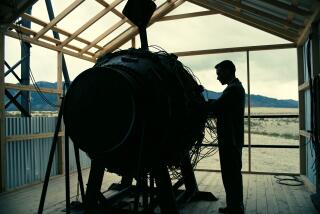THE OTHER NUREMBERG: The Untold Story of the Tokyo War Crimes Trials<i> by Arnold C. Brackman (Morrow: $19.95; 422 pp., illustrated)</i>
- Share via
The Tokyo War Crimes Trials was the Pacific War’s answer to Europe’s “Judgment at Nuremberg.” But, the trial of Nazi Germany’s wartime leaders has always dominated both American perceptions of the immediate aftermath of World War II and the extensive literature on how the Axis elite was brought to justice.
Arnold C. Brackman, a journalist who covered the 1946-1948 Tokyo trial, has now attempted to remedy this imbalance in “The Other Nuremberg.” He really believes the implications of his title.
Germany under Hitler and Japan under Tojo were both, in Brackman’s view, brutal, expansionist powers that committed massive crimes against humanity. The author even claims that the Japanese army penetrated “a holocaust” in China that claimed 6 million lives.
Disturbed by short American memories of Japanese wrongdoing during the war, Brackman is even more concerned with the creeping amnesia that characterizes contemporary Japanese understanding of their own pre-democratic nightmare. He has apparently been aroused and alarmed for a very long time, for he claims to have spent much of the last 25 years on research for the book.
Every major topic receives a chapter, from the selection of the judges to the character of the lawyers, from the testimony on Philippine atrocities to the day of judgment itself. The table of contents suggests an exhaustive academic study, but inevitably, the book presents only a partial picture of a massive trial that lasted 2 1/2 years, involved testimony from more than 400 witnesses, and attempted to trace a would-be military conspiracy that lasted four decades.
Brackman’s strengths and weaknesses are those of a particular type of pavement-pounding reporter. He is good on courtroom events because he was there; less satisfying on the historical background and as an interpreter of human actions.
He is particularly bad on people he doesn’t like. The Japanese wartime leaders frequently come across as paper cutouts with black hats. In an otherwise useful list of all “indicted Class A war criminals,” the author sometimes seems petty. He describes Gen. Hiroshi Oshima, for example, as “a vain, arrogant bon vivant.”
Evidence is another problem. While reading, “The Other Nuremberg,” one begins wishing for even the trappings of scholarship. The bibliography is only a guide to further reading. Other than the few documents and newspapers cited in the text, there are no references. Brackman declares early that “every quote in this book is genuine.” This may be so, but even selective footnotes and references would have enormously enhanced the persuasiveness of the author’s observations and conclusions.
Despite its length, “The Other Nuremberg” is not only a rather racy read but a message from better times. It is like finding a time capsule from 1948. In readers who experienced the victory and its aftermath, the author will evoke a powerful stream of nostalgia for the moral certainties and manifest national virtue of America’s “Good War.”
But where some will see “Back-to-Bataan” certitude, many others, especially those who experienced the bitterness of our internment camps or the agonies of Vietnam, will find moral naivete and “my country--right-or-wrong” prejudice.
As a harvest of facts, stories and vignettes from the American occupation of Japan in general, and the Tokyo trial in particular, “The Other Nuremberg” is a remarkable work. As a sharp indictment of Japanese wartime behavior, it makes compelling reading.
But, as a defense of the Tokyo trial, Brackman’s arguments do not finally stand up to the critique made in Richard H. Minear’s sometimes polemical, but always incisive “Victors’ Justice: The Tokyo War Crimes Trial” (1971).
The Tokyo trial attempted to prove an elaborate and finally improbable conspiracy by Japanese leaders to make aggressive war, which was finally unsustainable in terms of the international law of the period. By definition, the trial proceeded on the unlikely assumption that only the losers (i.e. the Japanese) committed “war crimes.” Whatever his sins, Gen. Tojo’s claim that the trial represented “victors’ justice” cannot be unambiguously refuted. If one is suspicious of Japanese ultranationalism, then or now, the Tokyo trial is not the place to make a stand.
More to Read
Sign up for our Book Club newsletter
Get the latest news, events and more from the Los Angeles Times Book Club, and help us get L.A. reading and talking.
You may occasionally receive promotional content from the Los Angeles Times.










